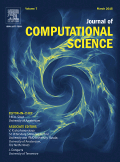 The Journal of Computational Science is seeking submissions for a special issue on The Route to Exascale: Novel Mathematical Methods, Scalable Algorithms Skills Training.
The Journal of Computational Science is seeking submissions for a special issue on The Route to Exascale: Novel Mathematical Methods, Scalable Algorithms Skills Training.
Novel mathematics and mathematical modeling approaches together with scalable scientific algorithms are needed to enable key science applications at extreme-scale. This is especially true as HPC systems continue to scale up in compute node and processor core count. These extreme-scale systems require novel mathematical methods to be developed that lead to scalable scientific algorithms to hide network and memory latency, have very high computation/communication overlap, have minimal communication, have fewer synchronization points. With the advent of Big Data in the past few years the need of such scalable mathematical methods and algorithms able to handle compute intensive and applications with Big Data at scale becomes even more important.
Scalable mathematical methods and corresponding scientific algorithms for multi-petaflop and exa-flop systems also need to be fault tolerant and fault resilient, since the probability of faults increases with scale. Resilience at the system software and at the algorithmic level is needed as a crosscutting effort. Finally, with the advent of heterogeneous compute nodes that employ standard processors as well as GPGPUs, mathematical methods developed and scientific algorithms need to match these architectures to extract the most performance. This includes different system-specific levels of parallelism as well as co-scheduling of computation. Key science applications require novel mathematics and mathematical models and system software that address the scalability and resilience challenges of current- and future-generation extreme-scale HPC systems. In addition the Computational Science research skills are a crucial component in first bridging the existing skills gap and also in equipping the scientists and researchers with the so needed Computational Science research skills for exascale.
Topics:
- Mathematical and algorithmic challenges and approaches towards exascale and beyond
- Novel Mathematical methods and mathematical modelling approaches that possess the scalability properties required for extreme scale computing
- Novel scientific algorithms that improve performance, scalability, resilience, and power efficiency
- Crosscutting approaches, e.g. mathematical methods and algorithmic approaches addressing scalability challenges
- Scientific algorithms that can exploit extreme concurrency (e.g. 1 billion for exascale by 2022)
- Naturally fault tolerant, self-healing, or fault oblivious scientific algorithms
Important Dates:
Submissions are due May 30, 2015.



